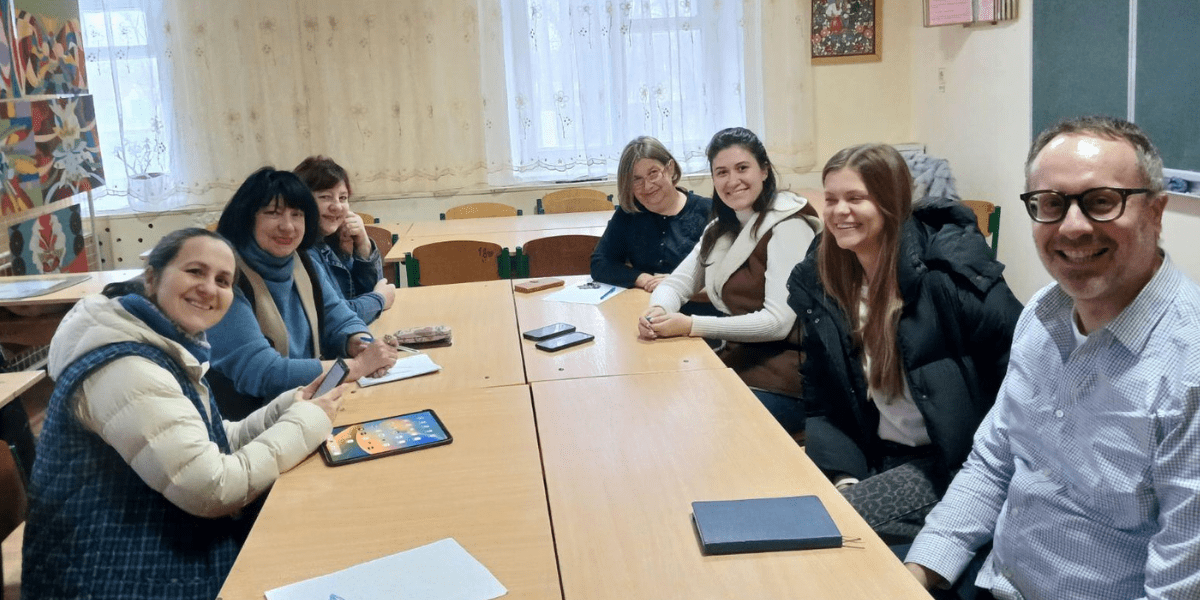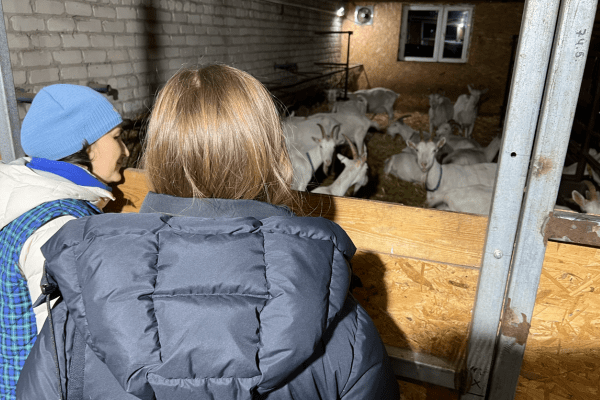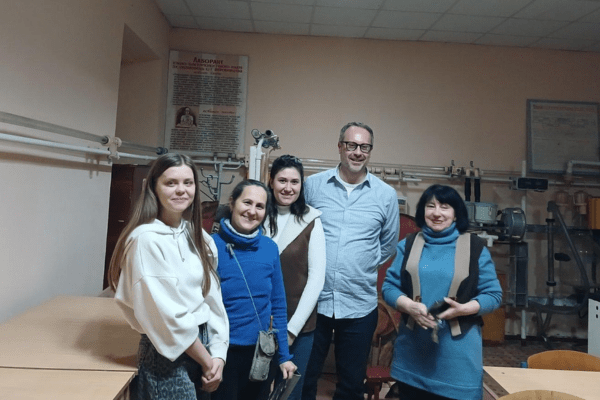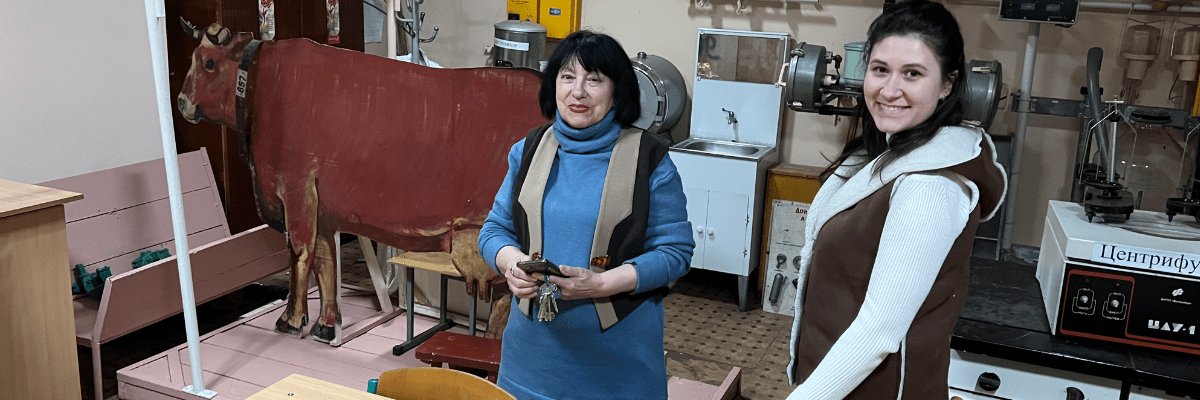This blog was contributed by Ivan Zenar, Deputy Director of International Development and Humanitarian Programs at VWB, following his recent visit to Ukraine. His reflections highlight the challenges facing rural veterinary care, the resilience of local farmers, and the urgent need for One Health approaches in humanitarian response efforts.
During his time in Ukraine, Ivan witnessed firsthand the realities of life in communities affected by conflict. Alongside VWB's Ukraine Program Manager, Daria Kuznetsova, he traveled from Kyiv to Dnipro—just 200 kilometers from the frontline—before reaching the small rural town of Perechepyne. Here, VWB has been working to strengthen veterinary care and support sustainable livelihoods, providing critical assistance to farmers navigating the ongoing crisis.
The challenges of rural veterinary care
Ukraine’s full-scale invasion has left millions displaced, with about 10–20% of the Dnipro region’s population now consisting of internally displaced persons (IDPs). While many IDPs have successfully found work in rural areas, others, particularly the most vulnerable—elderly individuals, female-headed households, and people with disabilities—face significant challenges, including the inability to evacuate their livestock from conflict zones. This has left many farmers struggling to protect their animals as fighting encroaches on their land.
Despite these hardships, rural communities remain deeply committed to their agricultural way of life. In Perechepyne, a town north of Dnipro, local farmers welcomed Ivan and the VWB team, eager to showcase their progress and discuss the challenges ahead.
A project that transforms lives
Perechepyne has been the site of a transformative initiative focused on goat farming and cheese production. Originally launched with the support of Mars and implemented by NGO Perspective, the program distributed goats to local families, ensuring a sustainable source of milk and income. Beneficiaries received not only livestock but also training in animal husbandry, disease prevention, and cheese-making—equipping them with the skills needed to build viable, long-term businesses.
Even though the formal project phase has ended, the impact continues to ripple through the community. New families are still receiving goats from the original beneficiaries, and cheese production is expanding, offering a critical source of income for rural households. However, challenges persist, particularly in modernizing equipment and ensuring that vocational training programs prepare students for real-world agricultural work.
“The vocational institute we visited in Perechepyne provides training in dairy production, but most of their equipment and curriculum date back to the 1980s,” Ivan observed. “When students enter the workforce, they find themselves working with modern technology they’ve never used before. There’s a real need for updated resources.”

The growing demand for veterinary care
Beyond sustainable farming, their visit highlighted the urgent need for veterinary services. In Ukraine, access to veterinary care has become increasingly difficult, particularly in frontline and rural areas. According to recent estimates, over 95% of the animals rescued by organizations like Pet Patron Center come directly from war zones. The center, which Ivan and Daria visited, has set a gold standard for animal welfare in Ukraine.
“The quality at Pet Patron Center was remarkable,” Ivan recalled. “Everything is well-organized, with heated floors, comfortable spaces, and a dedicated team ensuring the animals receive the best possible care. The shelter workers go to extraordinary lengths to rescue animals from frontline areas. One video showed our partner, 12 Guards, in full body armor retrieving a dog left chained in a destroyed village—risking their lives to save just one life.”
Despite these efforts, the scale of need remains overwhelming. Thousands of animals require urgent care, and many displaced people have been forced to leave their pets behind. While some shelters have developed partnerships to rehome animals abroad, the local capacity for veterinary services remains stretched thin.
The road ahead: One Health and holistic support
One of the most significant gaps identified during Ivan’s visit was the lack of One Health programming in existing humanitarian efforts. Many organizations focus primarily on immediate relief, but few integrate animal health, environmental sustainability, and human well-being into a cohesive strategy.
“The humanitarian response needs to continue,” Ivan emphasized. “But we also need to think long-term—helping people rebuild their lives, develop skills, and sustain their livelihoods. Small-scale farming support, veterinary care, and relocation assistance for livestock are all critical areas where intervention is needed.”
One of the most pressing challenges is the question of how to help farmers move their animals when conflict threatens their land. Financial aid alone is not enough—solutions must be developed to physically transport livestock, especially for the elderly and other vulnerable populations who refuse to evacuate without their animals.

VWB's Daria Kuznetsova and a partner overlook goats involved with VWB's goat training program in Ukraine.
 VWB’s team meets with staff at the Pereschepyne Professional Lyceum. (L-R) Daria Kuznetsova (VWB), Olena Samarska - Program Manager, NGO Perspectives, Tetiana Ovcharenko - Deputy Director of the school, Ivan Zenar (VWB), & Olena Vaylo - Lab Technician Major Teacher
VWB’s team meets with staff at the Pereschepyne Professional Lyceum. (L-R) Daria Kuznetsova (VWB), Olena Samarska - Program Manager, NGO Perspectives, Tetiana Ovcharenko - Deputy Director of the school, Ivan Zenar (VWB), & Olena Vaylo - Lab Technician Major Teacher
Strength in the face of adversity
As Ivan’s journey through Ukraine came to an end, he was struck by the strength and courage of the people he met. “The resilience of Ukrainians is incredible,” he reflected. “Even amid airstrikes and constant stress, they find ways to move forward.”
For VWB, the mission remains clear: to continue supporting these communities, advocating for better veterinary care, and ensuring that animals—so integral to livelihoods and emotional well-being—are not forgotten. In the midst of unimaginable hardship, the people of Ukraine and their animals are holding on, proving that even in times of crisis, hope and determination endure.
Want to support animals and communities in Ukraine? Click here.





